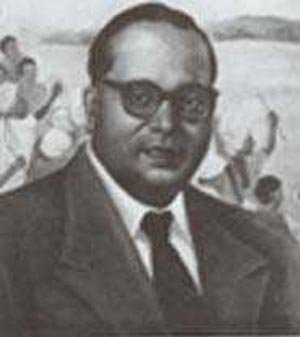
Dr. Bhimrao Ramji Ambedkar was born on 14th April, 1891. He was born in Central India as the fourteenth child to parents who belonged to the very lowest caste of Hindu society who are known as the dalits or untouchables. In 1908, Ambedkar passed the Matriculation exam from Bombay University. After graduating from Elfinstone College, Bombay in 1912, he joined Columbia University where he was awarded Ph.D for a thesis which he published in book form as ‘The Evolution of Provincial Finance in British India’. Later he joined the London School of Economics and obtained a degree of D.Sc. for his thesis, ‘The Problem of the Rupee’. He became a Professor of Political Economy in the Sydenham College of Commerce and Economics, Bombay in 1918.
In 1920, he started a Marathi Weekly paper called ‘Mooknayak’ to champion the cause of the depressed classes. He attended the depressed classes Conference on March the same year, under the Presidency of Chatrapati Sahuji Maharaj at Kolhapur. He later resigned Professorship at Sydenham College to resume his studies in London. He returned to India on April 1923 and started to practice in the Bombay High Court. He also attended the three Round Table Conferences that were held in London to enable representatives of the various Indian communities and the three British Political parties to consider proposals for the future constitution of India. He founded the ‘Bahishkrit Hitkarini Sabha’ on July 20, 1924 for the upliftment of the depressed classes. The aims of the Sabha were Educate, Agitate, and Organise.
He started Satyagraha at Mahad, a place in Kolaba district to secure to the untouchables the Right of access to the Chavdar Tank. He also started Satyagraha at Kalram Temple, Nasik to secure the Right of entry into the temple by the untouchables.
On September 1932, he signed the Poona Pact with M.K.Gandhi giving up the separate electorates granted to the depressed classes by Ramsay McDonald’s communal Award, and instead accepting representation through Joint Electorates which greatly increased the number of reserved seats. By signing this Pact, Ambedkar marked his emergence as the most influential leader of the untouchables. From 1932-34, he became a member of joint parliamentary committee on the Indian Constitutional Reform.
Ambedkar founded the Independent Labour Party and took part in the provincial elections that were held under the Government of India Act, 1935. In 1941, he was appointed to the Defence Advisory Committee and in the following year joined the Viceroy’s Executive Council as Labour Member.
In 1938, the Congress party introduced a bill making a change in the name of untouchables. i.e. they would be called Harijans meaning Sons of God. Dr. Ambedkar criticized the bill, as in his opinion the change of name would make no real change in their conditions. In 1947 August 15 India obtained her Independence. Dr. Ambedkar was elected to the constitution assembly by the Bombay Legislature Congress Party. He joined Nehru’s cabinet. He became the First Law Minister of Independent India. The Constitution Assembly appointed him to the drafting committee, which elected him as a Chairman on 29th August 1947. He completed the Draft Constitution of Indian Republic by February 1948. The Constituent Assembly adopted Article 17 of the Constitution for the abolition of Untouchability.
On September 9, 1951, he resigned from the Nehru cabinet because of the withdrawal of its support to the Hindu Code Bill. The Untouchability Bill was introduced in the Parliament in the Nehru Government in 1953.
Later in his life he embraced Buddhism as he felt it as the best religion which does not consider Untouchability. In 1950, he visited Sri Lanka where he addressed a meeting of the World Fellowship of Buddhists.
In 1955 he founded the Buddhist Society of India and installed a image of Buddha in a temple near Poona. Addressing the thousands of Untouchables who had assembled for the occasion, he declared that henceforth he would devote himself to the propagation of Buddhism in India.
He was awarded country’s top civilian award Bharat Ratna. Ambedkar died on 6 December 1956. He was cremated at Dadar Chowpati which is now known as Chaitya Bhoomi in Mumbai.
